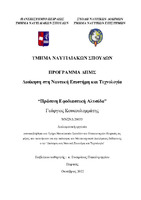Πράσινη εφοδιαστική αλυσίδα

View/
Keywords
Εφοδιαστική αλυσίδα ; Πράσινος εφοδιασμός ; Green logisticsAbstract
This thesis analyzes the green supply chain in detail. Initially, in the first chapter is made a historical review in the supply sector in order to understand its evolution and necessity during human kind period. Logistics sector consists of many different departments that unite the supply chain from the production and sourcing of raw materials, the production of the final product or service, to its final distribution to the consumer. In the second chapter, the environmental footprint of all these parts of the supply is analyzed separately for an in-depth understanding of the overall environmental footprint, which is not insignificant.
The third chapter refers to all these measures, innovative ideas and changes that need to be made both at the global level and at the European level, on a state but also on an individual level, so that the dire environmental situation we are in and will be in, if scientific environmental research is verified, will change and the idea of a sustainable global logistics system will be feasible by 2050. Perhaps 2050 it seems distant to us, but in reality it is very close because there are things and attitudes that can be changed in a short period of time (e.g. innovative ideas for using Energy), but there are also things that take whole decades to change environmentally friendly as are the infrastructures and the environmentally friendly Energy production technologies. In 2022 we see on a global scale the environmental effects of human activity perhaps more strongly than ever with long-term heatwaves, with prolonged drought, with innumerable fires, with the lowering of the sea level in many areas, with the increase of the sea level in others (Venice), with the increase in the temperature of the environment and the sea to such an extent that prohibitive survival conditions are created for many fish, with the accumulation of polluting substances in the atmosphere and in the marine environment, etc. All of the above does not sound complacent, on the contrary, it creates the necessity to take immediate new measures.


